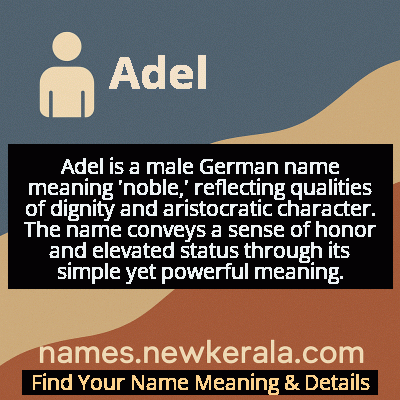Adel Name Meaning & Details
Origin, Popularity, Numerology Analysis & Name Meaning of Adel
Discover the origin, meaning, and cultural significance of the name ADEL. Delve into its historical roots and explore the lasting impact it has had on communities and traditions.
Name
Adel
Gender
Male
Origin
German
Lucky Number
4
Meaning of the Name - Adel
Adel is a male German name meaning 'noble,' reflecting qualities of dignity and aristocratic character. The name conveys a sense of honor and elevated status through its simple yet powerful meaning.
Adel - Complete Numerology Analysis
Your Numerology Number
Based on Pythagorean Numerology System
Ruling Planet
Uranus (Rahu)
Positive Nature
Strong sense of order, loyal, practical, and disciplined.
Negative Traits
Stubborn, overly serious, rigid, and prone to feeling restricted.
Lucky Colours
Blue, gray.
Lucky Days
Saturday.
Lucky Stones
Blue sapphire.
Harmony Numbers
1, 7, 8.
Best Suited Professions
Managers, engineers, accountants, organizers.
What People Like About You
Dependability, discipline, practicality.
Famous People Named Adel
Adel Tawil
Singer-songwriter
German pop singer and member of the band Ich + Ich, known for multiple chart-topping hits
Adel Karam
Actor and comedian
Lebanese actor known for his roles in Arabic cinema and Netflix's first Arabic original series
Adel al-Jubeir
Diplomat and politician
Saudi Arabian Minister of State for Foreign Affairs and former Foreign Minister
Adel Imam
Actor
Egyptian actor considered one of the most prominent Arab comedians with over 100 films
Name Variations & International Equivalents
Click on blue names to explore their detailed meanings. Gray names with will be available soon.
Cultural & Historical Significance
The name's journey through history reflects broader cultural exchanges between Europe and the Middle East, particularly during periods of trade, scientific advancement, and diplomatic relations. In medieval Germany, names containing 'adel' were often borne by knights and nobility, while in the Islamic Golden Age, individuals named Adel were celebrated for their wisdom and judicial fairness. This convergence of meanings—social nobility and moral justice—has made Adel a name that transcends its geographical origins to represent universal human ideals of excellence, dignity, and ethical leadership across diverse societies.
Extended Personality Analysis
Individuals named Adel are often perceived as possessing natural leadership qualities and a strong sense of justice. The name's meaning of 'noble' or 'just' tends to create expectations of dignified behavior, moral integrity, and fairness in decision-making. Many Adels demonstrate a calm, composed demeanor that inspires trust and respect from others. They typically exhibit refined manners and thoughtful consideration in their interactions, often serving as mediators in conflicts due to their balanced perspective. The name suggests someone who values tradition and principles while maintaining progressive thinking.
Adels are frequently described as reliable, honorable individuals who take their responsibilities seriously and approach challenges with strategic thinking rather than impulsive reactions. Their noble bearing often makes them natural role models in their communities or professional circles. While they may appear reserved initially, most Adels develop deep, meaningful relationships built on mutual respect and loyalty. They tend to excel in positions requiring diplomacy, judgment, and ethical decision-making, whether in professional settings or personal matters. The combination of strength and compassion associated with the name creates individuals who lead by example rather than authority alone.
Modern Usage & Popularity
In contemporary times, Adel maintains steady but moderate popularity across German-speaking countries and has gained international recognition through cultural exchange. While not among the top-ranking names in Germany currently, it enjoys consistent usage particularly among families valuing traditional names with noble connotations. The name has seen increased visibility in multicultural societies where its cross-cultural appeal—working well in both European and Middle Eastern contexts—makes it an attractive choice for internationally-minded parents. In recent decades, Adel has become more popular in Arabic-speaking countries and among Muslim communities worldwide, where its meaning of 'just' aligns with important cultural values. The name's simplicity and strong, positive meaning contribute to its enduring appeal across generations, maintaining relevance without becoming overly trendy or dated.
Symbolic & Spiritual Meanings
Symbolically, Adel represents the ideal of nobility beyond mere aristocratic birth—it embodies the concept of innate dignity, moral excellence, and leadership through character rather than position. The name carries connotations of fairness, balance, and ethical strength, suggesting someone who acts as a moral compass in their community. In metaphorical terms, Adel symbolizes the bridge between inherited status and earned respect, emphasizing that true nobility comes from one's actions and principles. The name evokes images of stability, tradition, and reliability while also suggesting progressive values of justice and equality. It represents the human aspiration toward higher moral ground and the universal desire for leaders who combine strength with compassion, authority with fairness. This symbolic richness makes Adel more than just a name—it becomes an embodiment of idealized human virtues across cultures.

